Voluntariatul prin ochii Emiliei
Am visat multă vreme să voluntariez în Africa și am citit multe informații despre realitățile acestui continent, Anul ăsta a fost mai dificil pentru mine deci să colectez și caut informații mi-a adus un fel de pace și mi-a păstat speranța de mai bine. Abia așteptam o gură de aer proaspăt într-o nouă călătorie. Îmi amintesc furtuna ”stai acasă” a izbucnit și am descoperit că fără călătorit mă simt ca un pește fără apă.
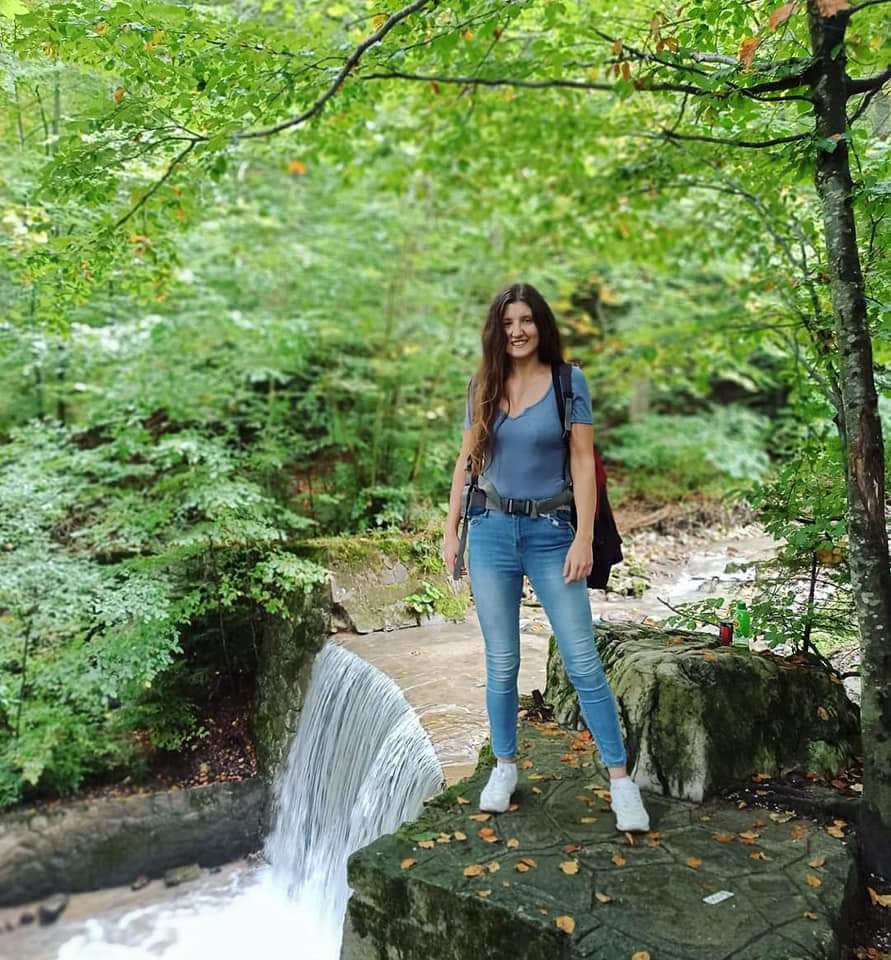
Acum două luni am primit o invitație de la Corpul European de Solidaritate să voluntariatez în România. La început credeam că este o glumă hazlie. Cum ar trebui să pot împacheta în câteva zile, să-mi părăsesc locul de muncă și să amân treburi importante, pentru a merge într-o țară în care nu am mai fost. Cu toate astea, ideea nu m-a lăsat să dorm. Era acolo, bâzâind în mintea mea. Am spus da! De ce nu? Și nu o regret deloc!
Am cunoscut o grămadă de oameni din diferite culturi. Deși fiecare voluntar are propriul proiect aici, am avut și șansa de a luncra împreună și a ne cunoaște mai bine. Unii dintre ei erau implicați în renovarea clădirii unde Curba de Cultură își are sediul principal. Am organizat evenimente, filme și promovare. Odată, am organizat o seară de film într-un sătuc mic, cu numai 15 locuitori. Am pregătit o cinema în aer liber cu ecranul pe o dubă. Am fost așa entuziasmați și am aranjat totul în mijlocul nimicului când, surpriză! A trebuit să înlăturăm o parte din scaune pentru a lăsa niște fermieri să treacă cu căruțele cu cai. După ce am reamenajat, patru copii timizi din sat au venit să vadă ce se întâmple, să vadă filmul. Îmi amintesc că am fost așa de fericită și entuziasmată pentru ei pentru că eu nu am avut parte de astfel de experiențe când eram mică.
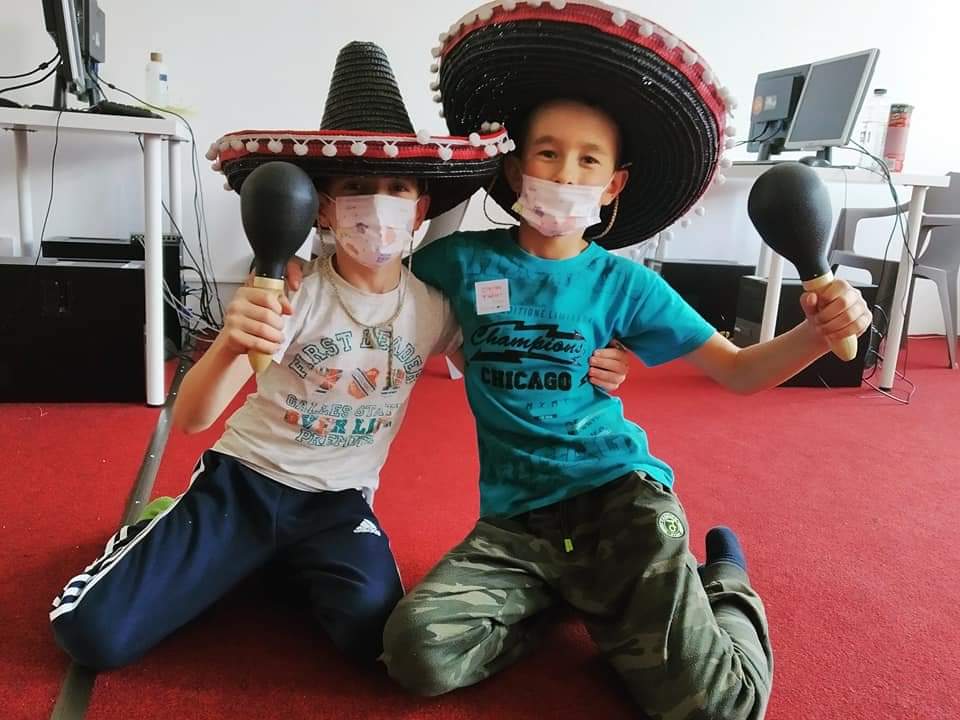
De-a lungul săptămânii lucram cu tineri și copii la Centrul de Tineret. Proiectul pentru care am venit s-a numit Descopră-ți potențialul. Scopul său a fost să creeze oportunități atât pentru tineri cât și pentru cei mici. Jocuri, distracție, integrare multiculturală, artă sau activități fizice și multe altele. Am învățat noi abilități sau limbi unii de la alții. Fiecare voluntar putea contribui cu ceva. Un bun exemplu este ultima lecție de spaniolă desfășurată afară de Robertp, sau atelierul de gătit cu Oana. Am pregătit ”zacuscă”, o pastă de legume tradițional românească pe care o poți mânca pe pâine și să simți doar bucurie.
Uneori, voluntariatul poate fi dificil, dar în același timp aduce mult bine în viețile altor persoane, mai ales alor noaste. Cred că fiecare dintre noi ar trebui să experimenteze asta măcar o dată în viață.
Una dintre experiențele pe care nu le voi uita a fost aceea de a face o cocă pentru 100 de clătite și 74 de brioșe. Noi eram responsabili cu gătitul tuturor acestora pentru evenimentul de promovare. Ne-am împărțit în echipe de cinci voluntari și am lucrat pentru acest eveniment festiv. Cei care mă știu sunt conștienți că mă ambalez destul de mult în bucătărie. Când am primit această sarcină eram destul de îngrijorată, dar până la urmă am reușit să o facem și să ne și simțim bine.
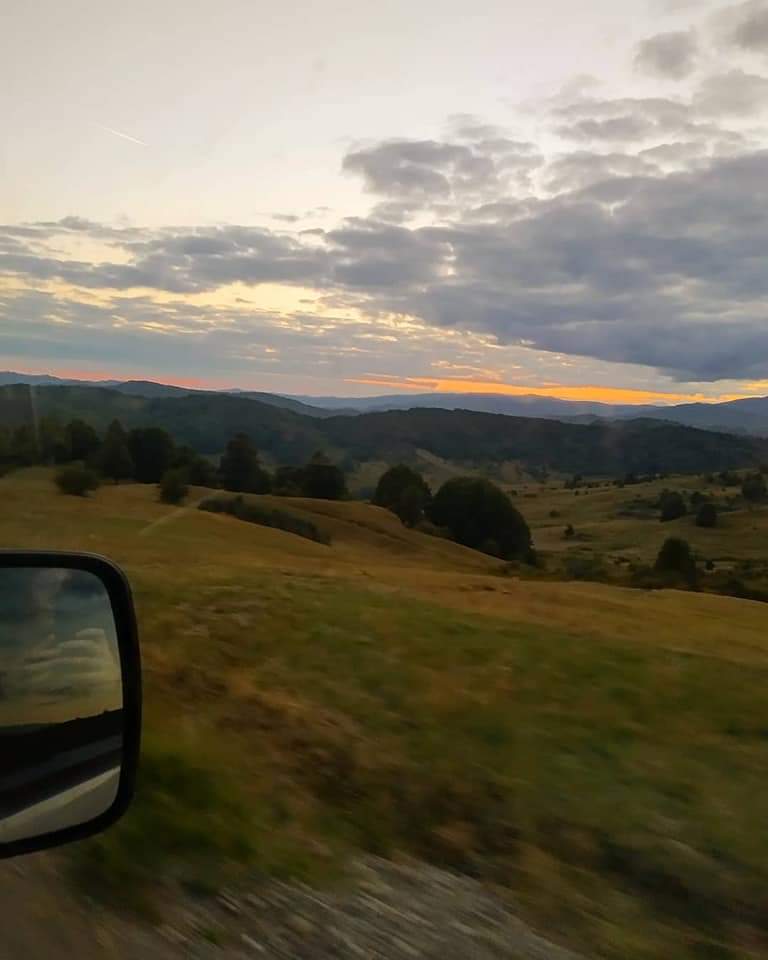
De obicei avem weekendurile libere pentru a putea merge să călătorim și să învățăm despre cultura locală. Sunt așa recunoscătoare că am profitat de acest timp în întregime. Am vizitat Bucureștiul, capitala, și am încercat bucătăria tradițională românească. Alpturi de un alt prieten, am văzut trei orașe frumoase și vechi: Sinaia, Brașov și Sibiu, situate printre munți. În timp ce făceam autostopul, am găsit o doamnă foarte drăguță care ne-a dus până la locația noastră. A fost surprinși să aflăm că aceasta era italiană, exact ca și prietenul meu Elia. M-a surpins și numărul de urși din zonă, dar nu m-a speriat îndeajuns încât să nu merg pe traseu și să încerc cățăratul multi-pitch pentru prima dată în viața mea. Am putut vedea orașul și munții dintr-un punct mai înalt. Timpul stă în loc când ai o astfel de priveliște.
Le datorez majoritatea acestor momente deosebite ce mi-au îmbogățit experiența oamenior minunați pe care i-am întâlnit. Cu care atât gătitul împreună cât și munca crâncenă au fost experiențe extraordinare. Oameni cărora nu le e frică de sentimente sau provocări. Care pot merge cu tine în toiul nopții la o nuntă în România pentru a explora cultura mediului local și a adânci relațiile interanționale la nunți tradiționale.
”Cerul nopții este foarte limpede aici. Mă duce cu gândul la casă și îmi dă un sentiment de singurătate. Mă uit la stele și mă simt așa mică în întregul univers. Dar, în același timp, cu persoanele potrivite lângă mine, mă simt atât de vie și sprijinită indiferent cât de departe de casă sunt.”
********************************************
I have long dreamed of volunteering in Africa and read a lot of information about the reality of this continent. This last year was more difficult to me so gathering information and searching gave me some peace and kept me dreaming about being better. I couldn’t wait for a fresh breath of air while on a new journey. I remember a time when the “stay home” storm broke out and then I discovered that without traveling I feel like a fish without water.
Two months ago, I got an invitation from the European Justice Corps to volunteer in Romania. At first, I thought it was a funny joke. How am I supposed to pack in a few days, leave my job and postpone many important matters, in order to go to a country where I have not been to before. However, the idea of it did not let me sleep. It was there, buzzing in my mind. I said yes! Why not? Well, I do not regret at all!
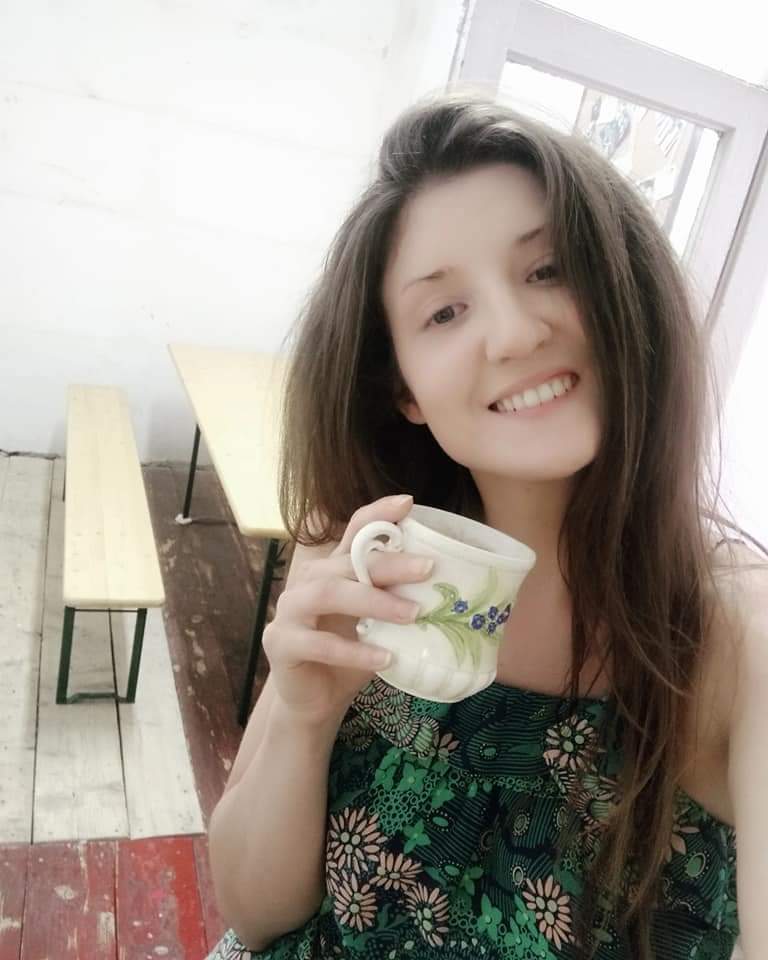
I met a lot of people from different cultures. Although, each volunteer has an individual project here, we also got the chance to work together and to get to know each other. Some of them were involved in the renovation of the building that would be the future headquarters of the Curba de Cultura organization. We organized events, film openings and promotions.
One time, we organized a movie night in a very small village, with only 15 inhabitants. We set up a field cinema on the back of the van. We were so excited and had everything arranged in the middle of nowhere, when.. surprise! We had to take away all the chairs to let some farmers pass with their horses. After rearranging four shy children from the village came to see what’s going on, to watch the movie. I remember being so happy and enthusiastic for them because I did not have any of this experiences when I was younger.
During the week, I was working with children and youngsters at the Youth Center. The project I have come for was called Uncover your Potential. Their purpose was to create opportunities for both young people and the youngest. Games, fun, multicultural integration, art or physical activities and many other activities. We learnt new skills or languages from each other. Each volunteer could contribute with something. A good example is the last Spanish lesson conducted outdoors by Roberto, or the cooking workshop lead by Oana. We prepared “Zacusca”, a famous Romanian veggie spread that you eat with bread and just feel joy.
Sometimes, volunteering can be difficult, but at the same time it brings a lot of good to other people’s lives, especially our own. I think each of us should experience it at least once in a lifetime.
One of the experiences I will never forget was making a dough for 100 pancakes and 74 muffins. We were in charge of cooking all of these for promotion event. We worked in teams of five volunteers and we prepared for this festival event. People who know me are aware that I make quite a fuss in the kitchen. When I got the assignment I was all worried but eventually we managed to do it and to have a good time as well.
Usually, we have the weekends free to be able to go traveling and learn about the local culture.
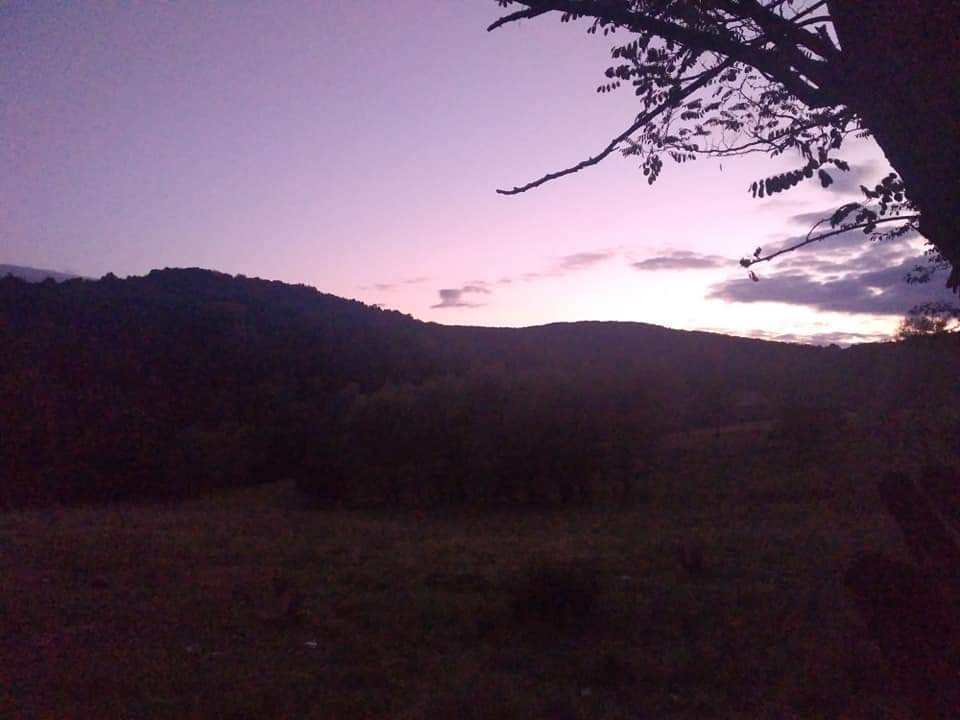
I am so grateful I took advantage of this time fully. I visited Bucharest, the capital, tried traditional Romanian cuisine. Along with another friend, I saw three beautiful old towns: Sinaia, Brasov and Sibiu situated among the mountains. While hitchhiking, we found a very nice woman who drove us to our location. We were surprised to find out that this woman was Italian exactly like my friend Elia. I was surprised by the number of bears in the local area, but it did not scare me enough not to go on the trail and try multi-pitch climbing for the first time in my life. I was able to see the city and the mountains from a higher perspective. Time stops when you have that kind of a view.
I owe most of these amazing and enriching moments I experienced here to the wonderful people I met. With whom both cooking meals together or hard work was an extraordinary experience. People who are not afraid of challenges or feelings. Who can go with you in the middle of the night to a wedding in Romania to explore the culture of the local environment and deepen international relations at traditional weddings.
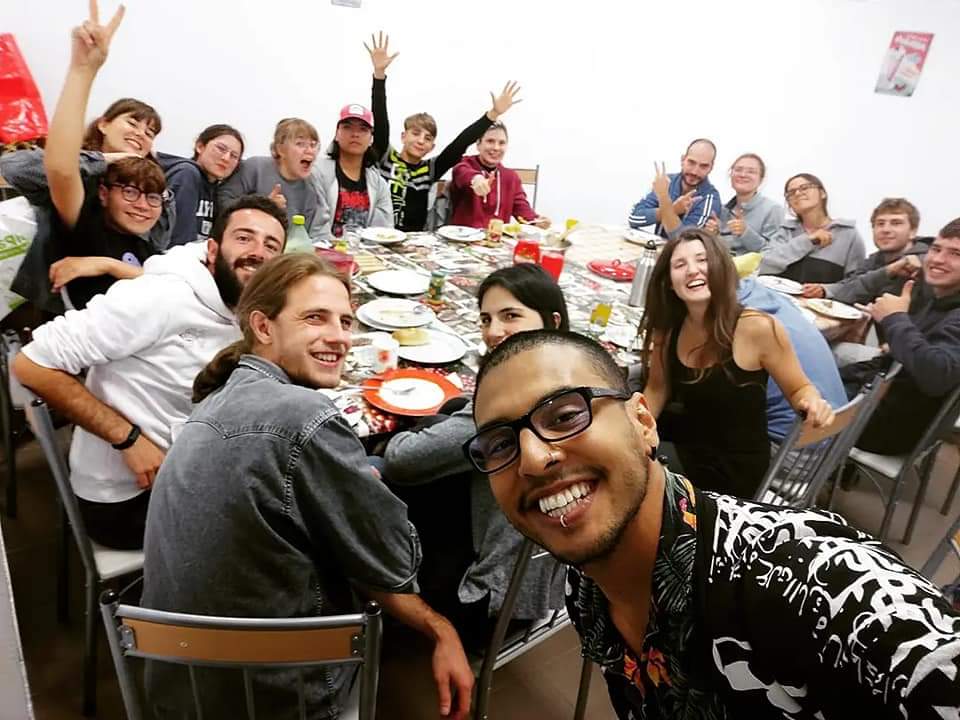
“The night sky is very clear here. It makes me think about home and gives me a feeling of loneliness. I look at the stars and I feel so tiny in the whole universe. But, at the same time, with the right people next to me, I feel so alive and supported no matter how far I am for my home!”
Science of composting in simple terms – Compostul pe înțelesul tuturor
Composting
Have you ever heard about composting? No… well let me tell you what it is.
In the simplest terms it’s a cycle of life. Organic matters are naturally decomposed in a process called composting. This process recycles various organic materials or waste products and produces a soil conditioner (the compost).
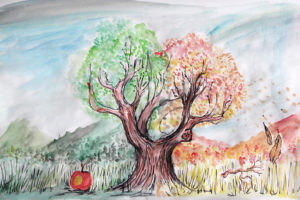
Simpler? A tree or a vegetable, maybe a fruit will grow, fall on the ground and most likely by next year same time will turn into dirt – and not just simple dirt, it will be highly nutritious dirt, extremely good for plants to grow. So living things (plants and such) are with time becoming hummus (a really good dirt for plants), and if you gather it pile in order to get hummus, you can call it composting.
Now to business. Composting is highly recommended in agriculture. Some say that animals are the best fertiliser producers, but they are wrong: it is indeed good, but it contains a lot of acid so you need wait a few weeks or even months before using it as a compost. And not even mentioning the smell. So, a better, less smelly way to compost is to start a compost pile. It is easy and if done RIGHT it will not smell at all! Also on the benefits side: in some cases it takes only 2 weeks before getting good and usable compost (awesome right?).
What do you need for it?
Not much: you need space (depending how big is the compost pile).
Also you need food leftovers, as these will be the things you want to get rid of and turning it in green stuff, known as a nutrition for compost.
Another thing you need is referred to as brown stuff, that means old wood or paper, leaves that have turned to brown or old grass that is already brown. Brown stuff is a building block for composting.
Lastly it needs some air and water. These are quite important things for compost. Since composting is a chemical reaction between brown and green stuff, if it does not get enough of air it will create a lot of gas (and yes it smells). Also with reaction like this compost piles can become hot and I mean REALLY hot. (Ever heard a compliment “wow you are hotter than a compost pile”? ) There are cases where dry compost piles have thought on fire, since in summer, a good compost pile has steady degrees of 60 C, and if it is not touched in long time it can grow to about 80 degrees C easily.
Not to scare you, but no – the facts are not from some sort of science fiction movie, they are real.
OK, lets start with a compost pile.
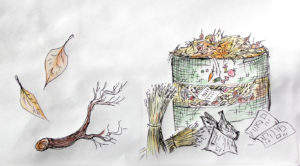 step 1: find a place in the shade on the middle of the day. In my home I have 1m diameter of fence circle, on the shade of a apple tree.
step 1: find a place in the shade on the middle of the day. In my home I have 1m diameter of fence circle, on the shade of a apple tree.
step 2: start a kind of sandwich with brown stuff and green stuff. A compost pile is composed from 80% of brown stuff and 20%green stuff. Just imagine a sandwich from this and try to build one … you but a bit of brown stuff and add 1/4th of green stuff, on top of that again brown stuff, added 1/4 green stuff and so on. Some tips would be also try to always end with brown stuff so it would not attract animals or flies (also it will prevent it from smelling)
Taking care of a compost pile
General rule is – if it smells you messed it up. That means it might not have enough of air, or too much of green stuff, meaning not enough of brown stuff to decompose that smelly green stuff. Maybe your compost pile is black? That means its overheating and you need to stir it. Yes its best to stir your compost pile once a week so it would not over heat and maybe to take that precious nutrition rich dirt that your plants grave for so so so so much.
Urban compost
But wait! What if you live in a city and want to compost at home? There is an soulution. All yo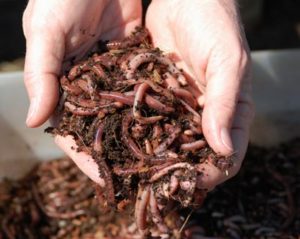 u need is a bucket, green stuff (some food leftovers), a bit of brown stuff (a old news paper will do), some water and some WORMS. But not any worms: you need a handful of worms from special species and you problem is solved (for example red wigglers are most popular). These compost worms are awesome, they speed up composting remarkably and as result you can collect worm juice. All that these guys are doing is eating, reproducing and leaving behind their poo, so juice is actually their pee, one of the most powerful organic fertilisers. You have to mix it with water though, 10:1 for not killing the plant itself, as it it very concentrated.
u need is a bucket, green stuff (some food leftovers), a bit of brown stuff (a old news paper will do), some water and some WORMS. But not any worms: you need a handful of worms from special species and you problem is solved (for example red wigglers are most popular). These compost worms are awesome, they speed up composting remarkably and as result you can collect worm juice. All that these guys are doing is eating, reproducing and leaving behind their poo, so juice is actually their pee, one of the most powerful organic fertilisers. You have to mix it with water though, 10:1 for not killing the plant itself, as it it very concentrated.
So, when composting in the city all you need to do is to water the little guys, feed them every once in a while, have a bit of time to time gather the compost and juice, and ooh – make sure that they will not get direct sunlight as this is what kills them.
Yes and no in a compost pile
YES
- organic materials like leaves, grass, and food scraps (not oily!)
- newspapers (most inks used in newspapers are not toxic)
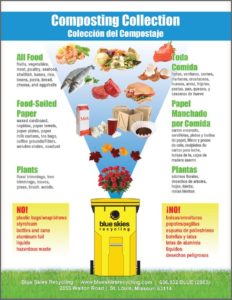
- tree bark
- all fruits and vegetables (including citruses)
- vegetable and fruit peels and ends
- coffee grounds and filters
- tea bags (even those with high tannin levels)
- grains such as bread, cracker and cereal (including moldy and stale)
- eggshells (rinsed)
- leaves and grass clippings (not sprayed with pesticides)
- paper towels (which has not been used with cleaners or chemicals)
NO
- meat and bones
- non organic waste as plastic
- oily materials
Compost
Ai auzit de compost? Nu… atunci dă-mi voie să îți spun ce este.
Pe scurt, este ciclul vieții. Materiile organice se descompun natural într-un proces numit compostare. Procesul reciclează variate materii organice sau resturi de produse și face un îngrășământ pentru sol (compost).
Mai simplu? Un copac ori o legumă, ori chiar un fruct va crește, va cădea pe pământ și până la anul va fi transformat în sol – și nu simplu sol, ci un sol cu proprietăți nutritive, extrem de bun pentru creșterea plantelor. Prin urmare ființele vii (plante și altele) se transformă în timp în humus (o materie foarte bună pentru plante), iar când aduni o astfel de grămadă de humus poți să o numești compost.
Compostul este foarte recomandat în agricultură. Unii zic că animalele sunt cei mai buni fertilizatori, dar se înșeală: sunt buni întradevăr, dar conțin mult acid, deci trebuie să aștepți câteva săptămâni sau chiar luni pentru a le folosi resturile ca și compost. Și să nu mai vorbim de miros. Un mod bun, mai puțin mirositor de a face compost este să faci o grămadă de compost. E ușor și dacă e făcut CORECT nu va mirosi deloc! Printre beneficii: în unele cazuri durează doar 2 săptămâni pentru a avea compost bun de folosit (minunat, nu?).
De ce ai nevoie?
Nu foarte multe: spațiu (depinde cât de mare e grămada de compost). Și mai ai nevoie de resturi alimentare, că astea sunt cele de care vrei să scapi, sunt chestiile verzi pe care le transformi în resurse pentru compost. Și mai ai nevoie de chestii maro, lemn vechi sau hârtie, frunze sau iarbă maro deja. Acestea sunt baza compostului.
Și în cele din urmă ai nevoie de aer și apă. Și astea sunt destul de importante pentru compost. Din moment ce compostarea este o reacție chimică între materiile maro și cele verzi. Dacă nu are suficient aer se vor crea gaze (și va mirosi). Totodată în reacțiile dintr-o grămadă de compost poate deveni foarte fierbinte. (Ai auzit vreodată de complimentul “ești mai fierbinte decât o grămadă de compost”?). Au fost cazuri în care grămezi uscate de compost au luat foc, căci pe timp de vară, o grămadă de compost are o temperatură constantă de 60 grade C și dacă nu este atinsă o perioadă poate ajunge la 80, cu ușurință.
Nu intenționez să te sperii, dar astea sunt fapte reale și nu filme science fiction.
OK, să facem o grămadă de compost.
Pasul 1: găsește un loc care e la umbră în miezul zilei. Acasă am un spațiu de 1 metru diametru îngrădit cu un gard, sub un măr.
Pasul 2: fă un sandviș cu materii maro și verzi. O grămadă de compost are 80% materii maro și 20% materii verzi. Imaginează-ți un sandviș din astea și fă unul. Deci materii maro și 1/4 materii verzi și apoi din nou maro și din nou versi. Un sfat, încheie cu materii maro, ca să nu atragi animale sau muște și pentru a nu mirosi.
Îngrijirea unei grămezi de compost
Regulă generală – dacă miroase ceva a mers prost. Adică ori nu a avut suficient aer, ori prea multe materii verzi și prea puține maro în care să se descompună. Poate grămada ta de compost e neagră? Asta înseamnă că s-a supraîncălzit și trebuie să o amesteci. Da, e bine să amesteci grămada de compost o dată pe săptămână, pentru a nu se încăzi prea tare și a distruge elementele nutriționale de care plantele tale au nevoie.
Compost urban
Dar stai! Dacă locuiești într-un oraș și vrei să faci compost? Există o soluție. Tot ce ai nevoie este o găleată, materii verzi (resturi alimentare), ceva materii maro (ziare vechi) niște apă și ceva viermi: ai nevoie de o mână de viermi dintr-o specie specială și problema ta este rezolvată (râmele sunt cele mai populare). Acești viermi pentru compost sunt minunați, ei grăbind procesul de compostare și ca rezultat poți aduna și un fel de suc. Tot ce fac vermii ăștia este să mănânce, să se reproducă și să lase în urma lor fecale și urină, urina fiind unul dintre cele mai puternice fertilizatoare. Totuși trebuie să o amesteci cu apă în proporție de 10:1, dacă nu vrei să distrugi plantele.
Deci, când faci compost în oraș nu trebuie decât să le dai apă acestori viermi și să îi hrănești din când în când, apoi să aduni compostul și sucul și să te asiguri că nu ajung în lumina directă a soarelui, căci îi va ucide.
Ce să pui și să nu pui în grămada de compost
DA
- materii organice precum frunze, iarbă și coji de fructe (care nu sunt uleioase)
- ziare (majoritatea cernelurilor nu sunt toxice)

- scoarță de copac
- fructe și legume (incluzând citrice)
- coji și cotoare de fructe și legume
- zaț de cafea și filtre
- pliculețe de ceai (chiar și cele cu conținut ridicat de tanin)
- produse de panificație, pâine, biscuiți, cereale (inclusiv cele mucegăite și învechite
- coji de ouă (clătite)
- resturi de iarbă și frunze (care nu au fost ierbicidate)
- prosoape de hârtie (care nu au fost folosite împreună cu chimicale)
NU
- caren și oase
- resturi non-organice (plastic de exemplu)
- materii uleioase
Raimo este în România pentru o perioadă de șapte luni, din mai 2018 până în noiembrie 2018, în cadrul proiectului Building Youth supportive Communities – Environment [2017-2-RO01-KA105-037748] proiect co-finanțat de Uniunea Europeană prin Programul Erasmus+ și implementat în România de către Curba de Cultură.
Leaving Romania / Părăsind România
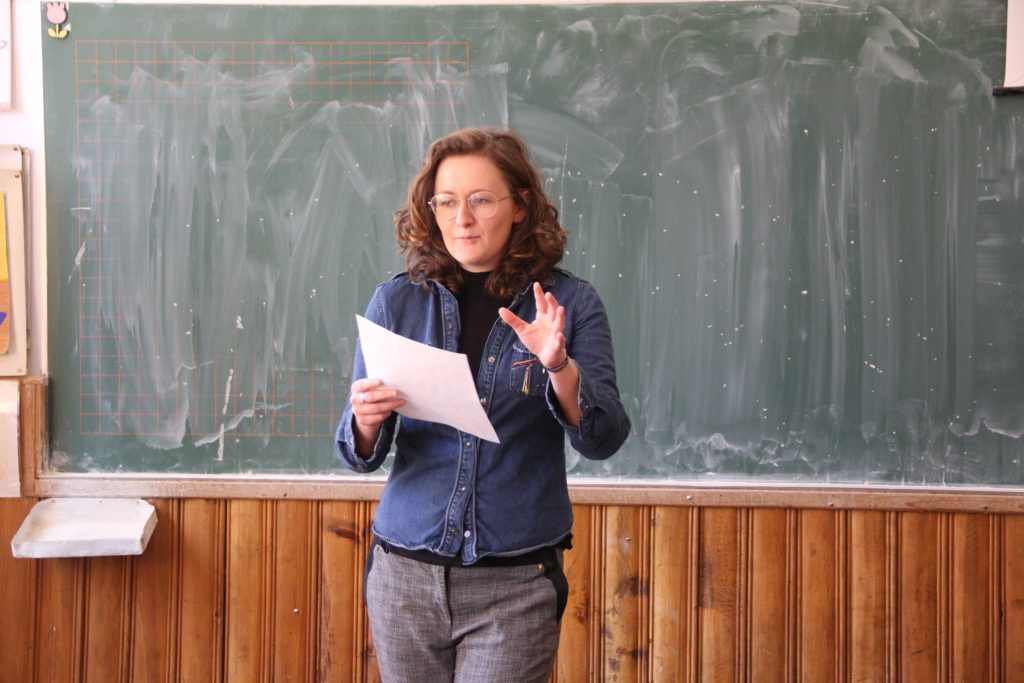
After almost six months that I have spent here, the time of my EVS project is coming to the end.
It’s incredible, that time has passed so fast on one point, but also sometimes I feel like I have been here for 6 years almost. I forgot about my pre-EVS life, my home country (Poland) and things which were bothering me in the past. I got used to this simple, village life, living in a small community, and being surrounded by nature. Jesus, it will be super hard to say goodbye!
I have arrived here in the beginning of March, it was still winter time. Well, beginning was not the easiest part. I came here by bus and after long hours of travelling I was so tired and… terrified. It was cold, very cold. I mean in my house also. I came and had to get used to the reality, where I have to make a fire if I want to take my jacket off in my room or have warm water to take a shower.
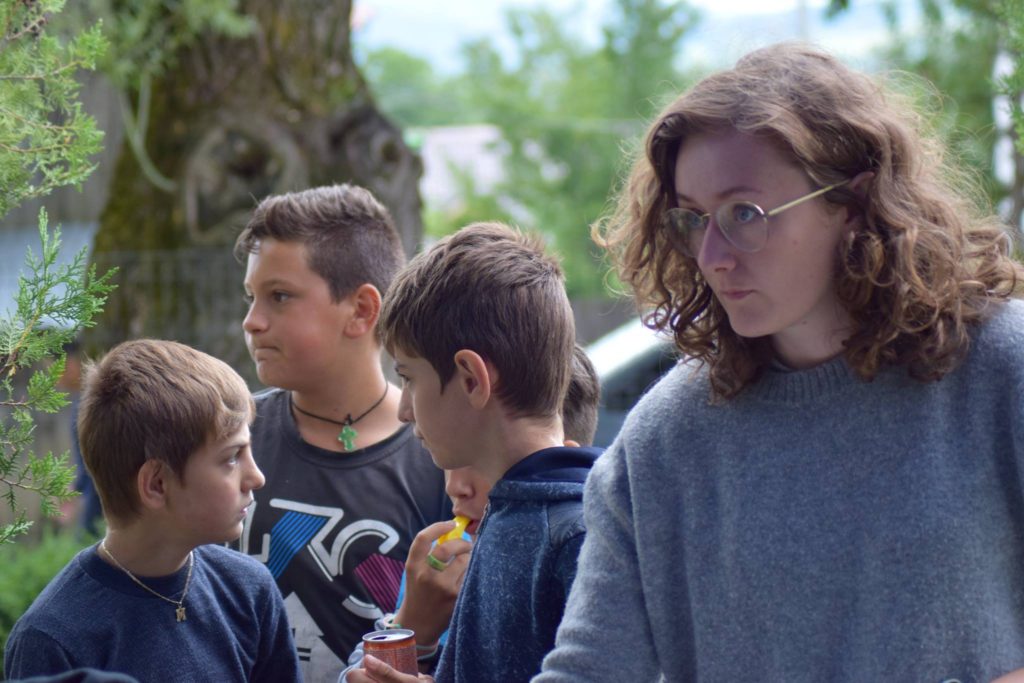
But it was just complicated in the beginning. With time I started to discover beauty of the situation and living conditions.
I spend such incredible time here, met so many inspiring people. Everyone had some impact on me, I could learn new things, discover new perspectives. Every moment, happy or sad, adventurous or just regular helped me to develop myself, change old, not working attitudes and replace them by new energy. I think it is an amazing opportunity to transform yourself and life.
Now, it is my last week here. I actually avoid to think about it like that. I rather think it is just a step forward to better future. Hopefully as interesting as my time here.
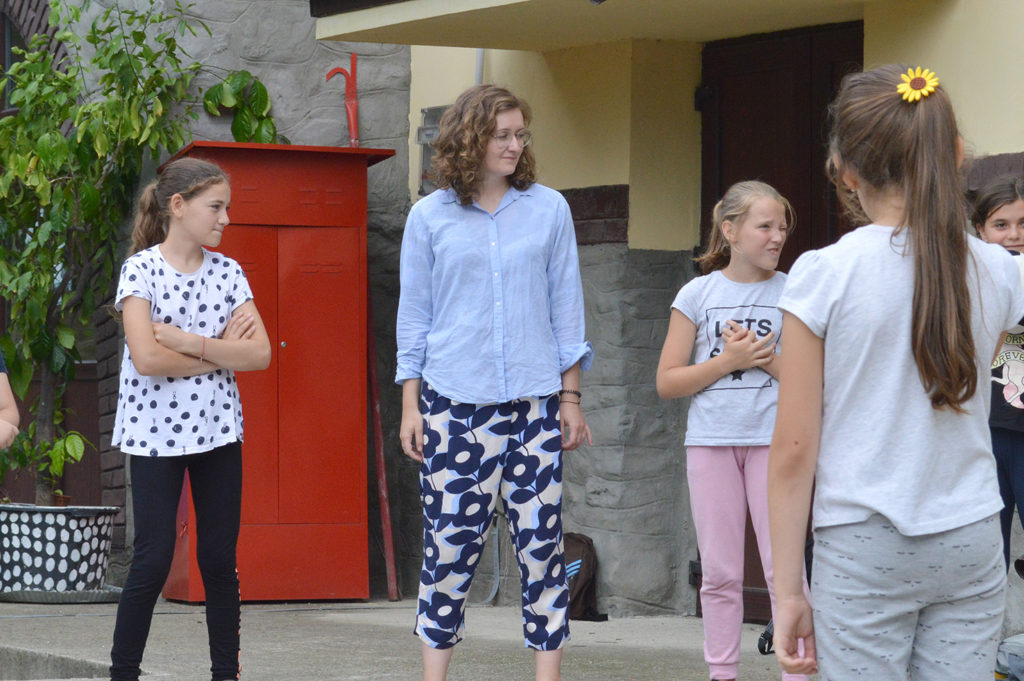
Thinking about saying goodbye to people and places here is a heartbreaking experience. But, luckily it is 21 century, so there is always a possibility to come back somehow. And great memories are stuck deep in my head.
__
După aproape 6 luni pe care le-am petrecut aici, timpul proiectului meu SEV (EVS) se apropie de a se sfârși.
E incredibil, că timpul a trecut așa repede pe de-o parte, dar de asemenea uneori mă simt de parcă am fost aici de 6 ani aproape. Am uitat de viața mea dinainte de viața de EVS, țara mea de origine (Polonia) și de lucrurile care mă deranjau în trecut. M-am obișnuit cu această simplă, viață la sat, cu a locui într-o comunitate mică, și a fi înconjurată de natură. Doamne, o să fie super greu să spun la revedere!
Am ajuns aici la începutul lui martie, era încă iarnă. Bine, începutul nu a fost cea mai ușoară parte. Am venit aici cu autobuzul și după lungi ore de călătorie eram atât de obosită și.. terifiată. Era frig, foarte frig. Mă refer de asemenea în casa mea. Am venit și a trebuit să mă obișnuiesc cu realitatea, unde trebuie să fac un foc dacă vreau să îmi dau jacheta jos în camera mea sau să am apă caldă pentru a face un duș.
Dar a fost complicat numai la început. Cu timpul am început să descopăr frumusețe în situație și în condițiile de a trăi.
Am petrecut timp așa minunat aici, am cunoscut așa de mulți oameni inspiraționali. Toată lumea a avut niște impact asupra mea, am putut învăța lucruri noi, descoperi noi perspective. Fiecare moment, fericit sau trist, aventuros sau pur și simplu obișnuit m-a ajutat să mă dezvolt, să schimb atitudini vechi, ce nu mai mergeau, și să le înlocuiesc cu energii noi. Cred că este o oportunitate extraordinară să te transformi pe tine și viața.
Acum, este ultima mea săptămână aici. De fapt evit să mă gândesc la asta așa. Mai degrabă mă gândesc că e doar un pas înainte spre un viitor mai bun. La fel de interesant ca și timpul meu aici sper.
Gândul la a spune la revedere oamenilor și locurilor de aici e o experiență care îmi frânge inima. Dar, din fericire este secolul 21, deci există întotdeauna posibilitatea de a veni înapoi cumva. Și amintiri minunate sunt prinse adânc în capul meu.
Anna este în România pentru o perioadă de șase luni, din martie 2018 până în august 2018, în cadrul proiectului Active Youth in Rural Settings [2017-1-PL01-KA105-035693] proiect co-finanțat de Uniunea Europeană prin Programul Erasmus+ și implementat în România de către Curba de Cultură.
Call for Slovenian, Portuguese, German and Estonian volunteers
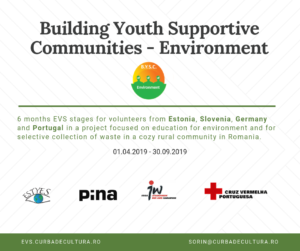
Curba de Cultură is looking for one volunteer from any of the following countries: Slovenia, Germany, Portugal or Estonia for a six months EVS in Izvoarele, a nice and cozy Romanian village.
Curba de Cultură focuses on teenagers and youth development. Our mission is to use non-formal education as a complementary method to the formal educational system for young people. We want to create the premises for a better development of the young people and their more suited integration within their respective communities. We want to make young people aware that they actively belong to their local and national culture.
We are looking for an 18-30 years old volunteer who has:
- motivation to live and work in rural area for 6 months
- motivation to work with youngsters and children
- motivation to do international volunteering
- basic knowledge of English both in writing and speaking
- interest in learning a different European language
The activities the volunteers would do, as part of the team, are:
- interactive activities, lectures, presentations, simulation games, role-plays with children and youngsters in the schools
- visits with pupils to the landfill and selective waste collection centre
- designing with students selective waste trash cans for classrooms
- preparations of the materials for the cans
- assembling and decorating the cans together with students
- organizing treasure hunts and other intercultural events
- writing blogposts and articles
- creating a brochure of the project
- attending trainings (education for environment, event management etc)
- preparing a dissemination event to be done after return to home country
Being an Erasmus+ project the volunteers receive:
- accommodation in a traditional Romanian house (but with wi-fi :P)
- pocket money and budget for food
- bus permits for local transport
- phone sim cards and monthly credit for it
- international travel costs up to 275 EUR for Slovenia, Estonia, Germany and Portugal reimbursed in the end of the stay
- Romanian language classes
- mentor support for personal development and personal learning plans
- coordinator support for implementing activities
- complete medical insurance through Cigna Insurrance Plan
- Youthpass certificate
- two international trainings provided by the Romanian National Agency
- internal trainings according to the topics of the project
- smiles and hugs 😉
Other details about the project:
- Name: Building Youth Supportive Communities – Environment
- Length: 6 months, starting ASAP and until end of September 2019
- Location: Izvoarele, Prahova County, Romania (the historical region of Walachia)
- Hosting/ Coordinating Organization: Curba de Cultură
- Sending organizations: Cruz Vermelha Braga (Portugal), PINA (Slovenia), Estyes (Estonia) and Jugendwerk de AWO – Karlsruhe (Germany)
If we caught your attention send us a CV and motivation letter asap at sorin@curbadecultura.ro
Also if you want to know more do not hesitate to ask using the same e-mail.
P.S. Explore this webpage to find out more about the community, the work and the volunteers we host.
Portret de voluntar – Tim (Portugalia)
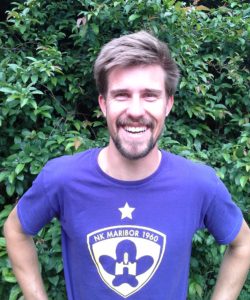 Boas! I’m 24 years old, I’m from the lovely Portuguese coastal city of Aveiro, and my name is Tim. You may think that this is not a very Portuguese name, and well, you’re right: my parents immigrated from Germany almost 30 years ago. Besides some travelling and a year of Erasmus exchange in Slovenia, I spent all my life in Portugal. There, I studied chemical engineering, finishing my master degree last year and working (very briefly) as a production engineer.
Boas! I’m 24 years old, I’m from the lovely Portuguese coastal city of Aveiro, and my name is Tim. You may think that this is not a very Portuguese name, and well, you’re right: my parents immigrated from Germany almost 30 years ago. Besides some travelling and a year of Erasmus exchange in Slovenia, I spent all my life in Portugal. There, I studied chemical engineering, finishing my master degree last year and working (very briefly) as a production engineer.
But something was missing.
I felt the weight of not having a concrete aim after leaving the university, and I was unable to build up enough motivation to work in a factory, producing some random goods that neither make people happier nor turn the world into a better place.
So, when the opportunity arose to be part of an environmental education project at Curba de Cultură, it didn’t take me long to pack my stuff and move further east than I’ve ever been before.
Besides some reforestation journeys back home, I have never really volunteered, and the only work with children I have done so far were some gymnastics lessons. So yes, I’m pretty much out of my comfort zone. And that’s great. It means that there is a lot for me to learn.
I love sports of almost any kind, and I already had the chance to practice a bunch of them, my latest passion being tennis. I’m also fond of everything that involves nature and being outdoor, such as hiking, cycling and gardening.
Sal’tare! Am 24 de ani, vin din adorabilul oraș Aveiro de pe coasta Portugaliei și mă numesc Tim. Probabil credeți că ăsta nu e un nume foarte portughez, ei bine, aveți dreptate: părinții mei au emigrat din Germania cu 30 de ani în urmă. Înafară de câteva călătorii și un an de studii Erasmus în Slovenia, mi-am petrecut restul vieții în Portugalia. Acolo am studiat Chimie Industrială, am terminat masteratul anul trecut și am lucrat (puțin) ca inginer de producție.
Dar ceva lipsea.
Am simțit apăsarea faptului că nu aveam un scop precis după terminarea facultății și nu eram capabil să mă motivez suficient cât să lucrez într-o fabrică, făcând niște obiecte care nu fac oamenii fericiți și nici nu fac lumea mai bună.
Prin urmare când a apărut ocazia de a deveni parte a unui proiect de educație pentru mediu la Curba de Cultură, nu mi-a luat mult să îmi împachetez lucrurile și să mă mut mai la est decât am fost vreodată.
Înafară de câteva acțiuni de împădurire, nu am făcut voluntariat, și singura muncă pe care am făcut-o cu copii au fost orele de gimnastică. Da, sunt înafara zonei mele de confort și asta e minunat. Și mai înseamnă că există multe pe care pot să le învăț.
Iubesc sporturile de orice fel și am avut șansa să practic câteva dintre ele, dar cea mai recentă pasiune a mea este tenisul. De asemenea orice implică natura și statul afară mă încântă, precum drumețiile, ciclismul și grădinăritul.
Tim este în România pentru o perioadă de șapte luni, din mai 2018 până în noiembrie 2018, în cadrul proiectului Building Youth supportive Communities – Environment [2017-2-RO01-KA105-037748] proiect co-finanțat de Uniunea Europeană prin Programul Erasmus+ și implementat în România de către Curba de Cultură.
Portret de voluntar – Anna (Polonia)
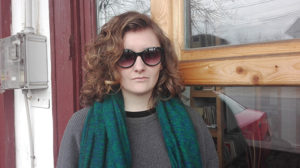 My name is Anna, I’m 28 years old and I come from Poland. For long time after I graduated from University ( pedagogy, social rehabilitation) I have worked with youth and children from dysfunctional families. I have also been a volunteer and coordinator in many projects in polish drug rehabilitation centres, which was a great practice for me. After years living in Poland I was tired and bored of the reality, so I decided to do something different. And that is how I ended up in EVS in Romania. I didn’t know much about this country, but I was very hungry for knowledge and new experiences. My first associations with Romania? Dracula (!), Transylvania and…Cristian Mungiu. The more I started to read about this country, the more I realized how fascinating this place is and how rich is a culture and the nature of Romania. I hope I will explore as much as it is possible. I also hope to improve my English, learn a little bit of Romanian and least, but not last to gain new professional experience, working with teenagers from different nationality than my own.
My name is Anna, I’m 28 years old and I come from Poland. For long time after I graduated from University ( pedagogy, social rehabilitation) I have worked with youth and children from dysfunctional families. I have also been a volunteer and coordinator in many projects in polish drug rehabilitation centres, which was a great practice for me. After years living in Poland I was tired and bored of the reality, so I decided to do something different. And that is how I ended up in EVS in Romania. I didn’t know much about this country, but I was very hungry for knowledge and new experiences. My first associations with Romania? Dracula (!), Transylvania and…Cristian Mungiu. The more I started to read about this country, the more I realized how fascinating this place is and how rich is a culture and the nature of Romania. I hope I will explore as much as it is possible. I also hope to improve my English, learn a little bit of Romanian and least, but not last to gain new professional experience, working with teenagers from different nationality than my own.
Privately I am very open-minded person, I love to meet new people, travel and discover beauty in every, even not so obvious places. I also love to read books, going to the cinema and especially to the theatre, which is my new passion. I would like to see some plays here also. I will do everything I can to spend an inspiring and productive time here. And come back with thousand of great memories and photos.
Numele meu este Anna, am 28 de ani și vin din Polonia. Pentru o bună bucată de vreme, după ce am terminat facultatea (pedagogie, reabilitare socială) am lucrat cu tineri și copii care proveneau din familii disfuncționale. Am fost voluntar și coordonator în proiecte desfășurate de centre de reabilitare poloneze, lucru care a constituit o bună practică. După atâția ani de trăit în Polonia am obosit și m-am plictisit de cotidian, prin urmare am decis să fac ceva diferit. Și așa am ajuns în acest SEV în România. Nu știam prea multe despre țara asta, dar sunt dornică de noi cunopștințe și experiențe. Ce îmi vine în minte legat de România? Dracula (!) Transilvania și… Cristian Mungiu. Cu cât citesc mai mult despre țara asta, cu atât mai mult descopăr căt de fascinant e acest loc și ce cultură și natură bigată are România. Sper să pot explora cât mai mult. De asemenea sper să îmi îmbunătățesc engleza, să învăț ceva română și nu în ultimul rând să acumulez experiență profesională muncind cu tineri de o altă naționalitate decât a mea.
Înafară de asta sunt o persoană deschisă, îmi place să întâlnesc noi oameni, să călătoresc și să descopăr frumusețe orice locuri, chiar și în cele mai puțin evidente. De asemenea iubesc să citesc, să merg la film și teatru, astea sunt pasiunile mele. Mi-ar place să văd niște piese și aici. Voi face tot posibilul sp am parte de un timp productiv și inspirațional. Și să mă întorc cu mii de amintiri și fotografii.
Anna este în România pentru o perioadă de șase luni, din martie 2018 până în august 2018, în cadrul proiectului Active Youth in Rural Settings [2017-1-PL01-KA105-035693] proiect co-finanțat de Uniunea Europeană prin Programul Erasmus+ și implementat în România de către Curba de Cultură.
Portret de Voluntar – Adrianna (Polonia)
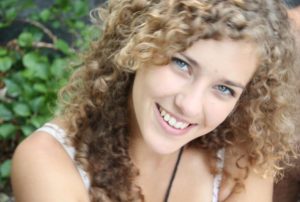 Salut! I’m Adrianna and I’m 24 years old. I come from Poland but for the past 6 years I’ve been living in all kinds of different parts of the world. Throughout my nomad life I went to American High School, studied in the UK, did courses and internships in Vienna, Singapore, London, and Edinburgh, and most recently spent 3 months volunteering in Ghana. So of course I love travelling, learning about different cultures and ways of living, and getting to know people. But my main interest is in dance – I have a Bachelor’s degree in Dance and Culture and I’ve explored many different forms of movement – contemporary dance, contact improvisation, African contemporary, Kathak (traditional Indian dance), yoga, and others. I’m passionate about exploring how movement reflects on the culture, dancing with people, and being creative whilst moving. I have other passions too – reading books, going on nature trails, trying new food (!), listening to good music, and engaging in all kinds of story telling and discussions,
Salut! I’m Adrianna and I’m 24 years old. I come from Poland but for the past 6 years I’ve been living in all kinds of different parts of the world. Throughout my nomad life I went to American High School, studied in the UK, did courses and internships in Vienna, Singapore, London, and Edinburgh, and most recently spent 3 months volunteering in Ghana. So of course I love travelling, learning about different cultures and ways of living, and getting to know people. But my main interest is in dance – I have a Bachelor’s degree in Dance and Culture and I’ve explored many different forms of movement – contemporary dance, contact improvisation, African contemporary, Kathak (traditional Indian dance), yoga, and others. I’m passionate about exploring how movement reflects on the culture, dancing with people, and being creative whilst moving. I have other passions too – reading books, going on nature trails, trying new food (!), listening to good music, and engaging in all kinds of story telling and discussions,
Saying that, my experience is a wild mix of different adventures – I have worked as assistant producer, choreographed my own pieces, co-directed a student dance company, danced with mixed-ability youth, and co-led scout troupe in Poland and teams of volunteers in Singapore and Ghana.
Now EVS in Curba de Cultura is my next adventure. I’m looking forward to learning about the Romanian culture, getting to know people, and exploring the beauty of this country (I’ve done some hikes already so I know that it is very beautiful here!). I’ll be looking out for opportunities to share and exchange ideas, movements and be creative together.
Salut! Eu sunt Adrianna, am 24 de ani și sunt din Polonia, dar în ultimii 6 ani am locuit în diferite părți ale lumii. În viața asta nomadă a mea am fost la liceu în America, am studiat în Regatul Unit, am urmat diferite cursuri în Viena, Singapore, Londra și Edinburgh, iar recent am făcut 3 luni de voluntariat in Ghana. Prin urmare iubesc să călătoresc, să învăț despre alte culturi și alte moduri de viață și să cunoasc oameni. Dar principalul meu interes este dansul – am o licență în Dans și Cultură și am explorat diferite tipuri de mișcare, de la dans contemporan, improvization contact, dans african contemporan, Kathak (dans tradițional indian), yoga și multe altele. Îmi place să explorez modul în care mișcarea reflectă cultura, modul în care oamenii dansează și cum să fii creativ în timp ce te miști. De asemenea sunt pasionată de lectură, plimbări în natură, să încerc noi feluri de mâncare, să ascult muzică bună și să mă implic în discuții și povești.
Prin urmare experiența mea este un amestec de aventuri – am lucrat ca asistent producător, mi-am coregrafiat propriile piese, am co-regizat un grup de dans studențesc, am dansat cu tineri cu diferite abilități și am condus un grup de cercetași în Polonia și o echipă de voluntari în Singapore și Ghana.
Acum un stagiu SEV la Curba de Cultură este noua mea aventură. Sunt curioasă să aflu mai multe despre cultura românească, să cunosc oameni și să explorez această țară frumoasă (am făcut deja scurte drumeții și știu că e frumos aici). De asemenea voi profita de șansele care apar pentru a împărtăși și schimba idei de mișcare și pentru a fi creativi împreună.
Adrianna este în România pentru o perioadă de șase luni, din martie 2018 până în august 2018, în cadrul proiectului Active Youth in Rural Settings [2017-1-PL01-KA105-035693] proiect co-finanțat de Uniunea Europeană prin Programul Erasmus+ și implementat în România de către Curba de Cultură.
Three years of hosting EVS volunteers
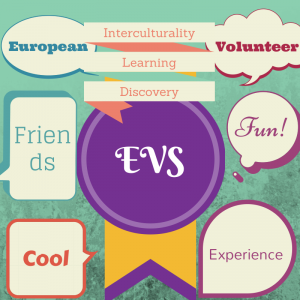 Curba de Cultură is hosting international volunteers for almost three years. We started in 2015 with one volunteer and in this moment there are 8 volunteers hosted simultaneously. From intercultural education done through nonformal methods in schools, outdoors, in the cultural centres and in the Youth Centre of Curba de Cultura to promoting volunteering through presentations and games and through videos showing EVS life, to gathering materials with regard to the specific of Izvoarele commune in order to promote it, to make it known and to show to people that rural Romania still has lots to offer.
Curba de Cultură is hosting international volunteers for almost three years. We started in 2015 with one volunteer and in this moment there are 8 volunteers hosted simultaneously. From intercultural education done through nonformal methods in schools, outdoors, in the cultural centres and in the Youth Centre of Curba de Cultura to promoting volunteering through presentations and games and through videos showing EVS life, to gathering materials with regard to the specific of Izvoarele commune in order to promote it, to make it known and to show to people that rural Romania still has lots to offer.
Below you can see collected, from some of the volunteers hosted, the thoughts they had in the end of their stay in Romania at Curba de Cultura.
Personal comments
For my personal and professional development, this EVS was the best decision I could take. I didn’t expect to have as many positive things in return and to feel as involved in the project. The main reason was to have a really serious and helpful hosting organization, with the coordinators and president who did all what I need to feel at home and comfortable with my new life. This experience was amazing! (Estelle, France – 9 months)
So I’m going out of this EVS with a lot of happiness, it teaches me a lot, to become someone better, to understand things better. (Mael, France – 5 months)
I am really glad to come here. I learnt a lot of new things, about culture, people, places, but also about myself. Thanks for those perfect 5 months! I will never forget it, and it changed a part of me, I am really proud of that, and it’s thanks to you. (Margot, France – 5 months)
I feel a better person. (Sophie, France – 12months)
I am proud to have done and European Voluntary Service and I changed a lot during 10 months. I found out what is my passion and what I want to do after EVS. (Liina, Estonia – 10months)
Truly I can say that I feel extremely strong person now and I hope that I will never lose this feeling. (Ania, Poland – 9 months)
Thanks to the EVS I got to know what I really would like to do in the future and I hope to make awesome cooperation with my hosting organization. (Eleny, Estonia – 5 months)
I feel different than 6 months ago, now I have a more clear idea about myself. I hope that every person that starts an EVS project has the fortune to meet an association with amazing people like my hosting organization. (Alessio, Italy – 6 months)
I would never expect so many new experiences, although some of them were harder than I would think in the beginning of my staying here. And I would definitely not expect people taking so awesome care about me and all of us, EVS volunteers. (Anna, Czech Republic – 6 months)
At first when I accepted to come on this project I was a little bit sad because it’s an village and you don’t have a lot of things to do here, but meeting others EVS volunteers and coordinators of the projects this changed, because they made this six months more interested. Talking with people from others city and listening to their problems with coordinators, housemates, project and mentor I was really happy that I was part of Curba de Cultura. (Martina, Croatia – 6 months)
Just thank you to whoever was the genius who invented EVS, and of course to Curba de Cultura – you are simply the best! (Melanie, Belgium – 6 months)
Would you recommend EVS to others? Why?
Yes, of course, I recommend it! Because whatever you do as an EVS, you will learn more than you expected and you will discover stuff which will change your state of mind. It permits to learn better about oneself and about the other. It’s very good experience to improve competences and to discover new ones. (Estelle, France – 9 months)
Yes, I would recommend other to do an EVS because it opens your mind, it makes you aware about things that you never be, never thought about. It can really change a life. New chances can appear. (Mael, France – 5 months)
I would recommend to everybody who can do it, to do an EVS. (Margot, France – 5 months)
Yes. It’s good to learn to live by yourself (Sophie, France – 12 months)
Definitely I would recommend EVS to other people. It is a great chance to do something for yourself, to become a better person and in the same time to help the local community in another country. (Liina, Estonia – 10 months)
EVS is a life changing experience which makes you richer. (Ania, Poland – 9 months)
I definitely recommend EVS: – new ways of seeing things around you, have a chance to think about your life, learn a lot about yourself, improve your skills, find friends for life. (Eleny, Estonia – 5 months)
Of course yes! EVS is something very great for personal growing and is an amazing life experience. (Alessio, Italy – 6 months)
EVS brings together people who would never meet and live together. It can be hard, it is hard, but is one of the biggest experiences and one of the biggest improvement people can reach in their life. (Anna, Czech Republic – 6 months)
I would recommend EVS to others people, because is the best way to learn about yourself, about your life and your future, what you like and what you don’t like. You also have opportunity to express yourself, give your ideas and together with others you implement your ideas, you can learn about different ways of work, different types of work witch’s going to help you in the future for your job. (Martina, Croatia – 6 months)
I would of course recommend anybody to do an EVS, simply because it can be an incredibly valuable experience that can have great impacts on your future in any sense and for me at least it was most definitely the best thing I did in my life. (Melanie, Belgium – 6 months)
Tradiții, obiceiuri și limbi diferite
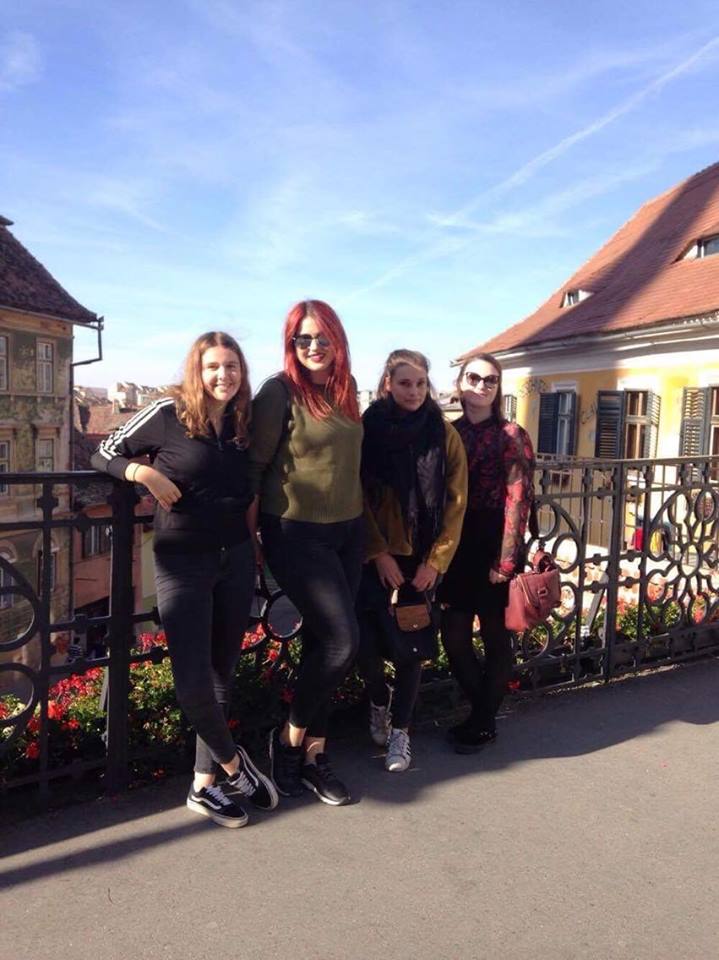 E normal ca atunci când mergi în străinătate să vorbești o altă limbă, să vezi alte culturi și alte tradiții. De când am sosit în România, vorbesc în engleză zilnic. Pe lângă asta am observat diferite alte curlturi, no doar cea românească, ci și a altor țări deoarece în biroul nostru lucrează oameni din zece țări, ceea ce înseamnă zece culturi diferite, zece tradiții și obiceiuri diferite.
E normal ca atunci când mergi în străinătate să vorbești o altă limbă, să vezi alte culturi și alte tradiții. De când am sosit în România, vorbesc în engleză zilnic. Pe lângă asta am observat diferite alte curlturi, no doar cea românească, ci și a altor țări deoarece în biroul nostru lucrează oameni din zece țări, ceea ce înseamnă zece culturi diferite, zece tradiții și obiceiuri diferite.
It’s normal when you go abroad that you will speak another language, see other cultures and traditions. Since I came to Romania I use English every day. Also I saw different cultures, not just the Romanian, other countries’ cultures as well. In our office work people from ten different countries, which means ten different cultures, ten different traditions and habits.
Să lucrez cu oameni de diferite feluri nu a fost niciodată o problemă, dar să împart camera și casa cu oameni necunoscuți, asta e ceva diferit. Să muncești și să locuiești, practic să îți petreci timpul cu oameni pe care nu îi știai dinainte și cu care nu vorbești limba maternă, este ceva nou și ceva cu care trebuie să te obișnuiești în SEV. Eu împart casa cu oameni din trei alte țări, toți avem obiceiurile noastre, felul nostru de a face lucruri. Dar găsim adesea lucruri în comun și ne bucurăm de timpul petrecut împreună, învățând unii de la alții. Împărtășim experiențele pe care le-am avut, gătim feluri tradiționale și încercăm unele noi, chiar dacă sunt neobișnuite.
Working with different type of people was never a problem, but sharing your room, your house with unknown people is a little bit different. Working and living, and spending your days with people you didn’t know before, and you can’t speak the same language, is something new for everyone and also something you need to get used to in EVS. I share the house with people from three different countries, we all have our own habits, our own way to do things. We also find some common things and we enjoy to spend time together, learning from each other. We enjoy sharing our experiences, cooking our traditional meals and trying new ones, even if some meals are unusual for us.
Cele mai amuzante momente rămân totuși cele în care nu știm anumite cuvinte în engleză și încercăm să le explicăm în limbile materne, sperând că vor fi similare sau la fel în engleză. Chiar dacă suntem diferiți am venit aici pentru același lucru, să ne descoperim și să îi descoperim pe ceilalți și să ne bucurăm de compania reciprocă.
The funniest moments come when we don’t know some word in English and we are trying to explain what we want to say and we say it in our languages, hopping that is similar or the same in English. Even if we are all different we came here for the same thing to discover ourselves and the others and we enjoy each other’s company.
Martina se află în România pentru o perioadă de 6 luni, din septembrie 2017 până în Februarie 2018 în cadrul proiectului Volunteer to Grow (ref nr 2017-1-HR01-KA105-035177), proiect co-finanțat de Uniunea Europeană prin Programul Erasmus+ și implementat în România de Asociația Curba de Cultură.
My favorite mentor! – Mentorul meu favorit!
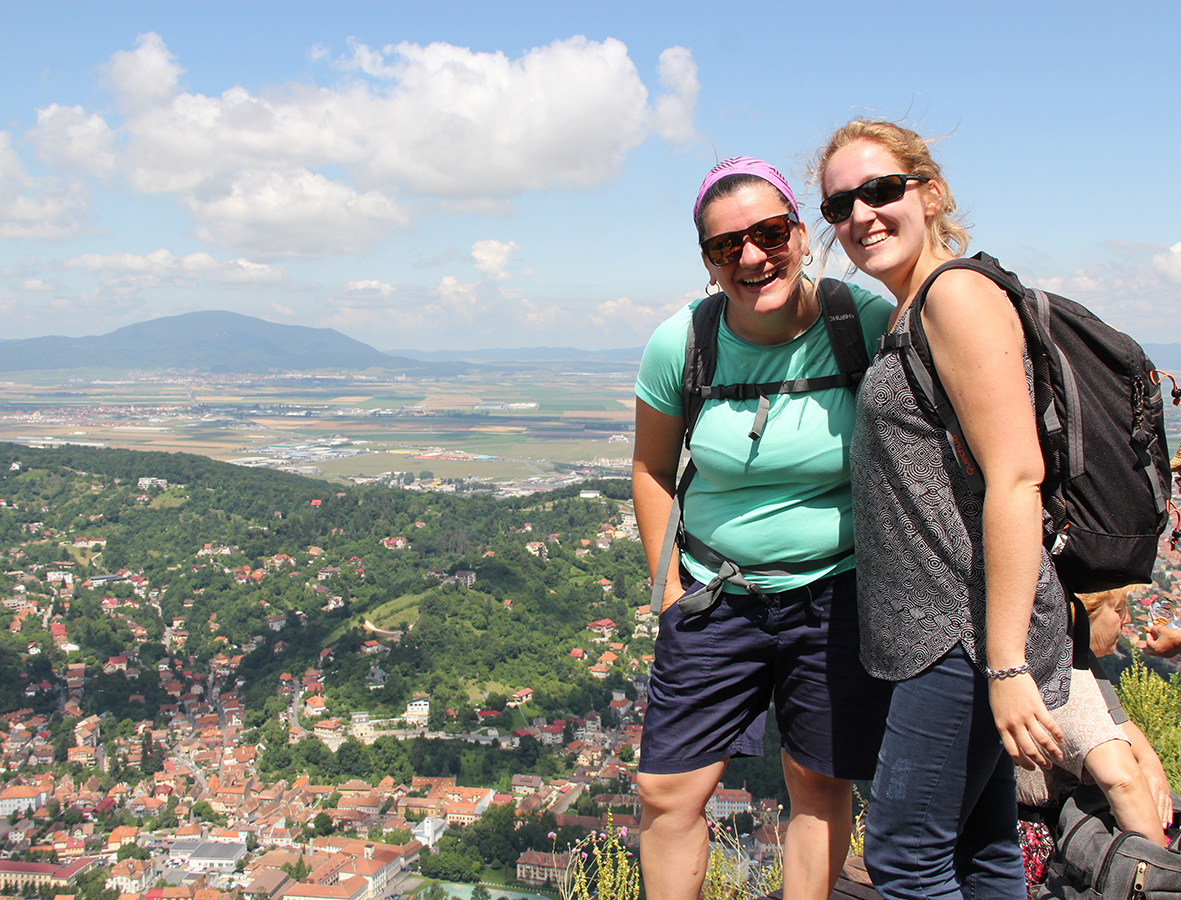 The European Volunteer Service isn’t only about the project, the house, the other volunteers, the coordinators, the association… it’s also about the mentor. Who? What? When? Where? I will explain you a bit.
The European Volunteer Service isn’t only about the project, the house, the other volunteers, the coordinators, the association… it’s also about the mentor. Who? What? When? Where? I will explain you a bit.
The mentor is an outside person of the association who takes care of the integration in your new environment and community, the evolution in your project, but in general he/she is the personal support during the EVS. You can meet as many time as you want and need during the project, in the association or another place that you decide together. But this is a short description, because in fact, he/she does more than we expect in terms of personal development and profesional evolution.
Serviciul European de Voluntariat nu este doar despre proiect, casă, alți voluntari, coordonator, asociație… este și despre mentor. Cine? Ce? Când? Unde? Vă voi explica puțin.
Mentorul este o persoană din afara organizației care este responsabilă pentru integrarea voluntarului în noul mediu și noua comunitate, pentru evoluția proiectului, dar in general el/ea reprezintă suportpe plan personal de-a lungul SEV. Poți să te întâlnești cu mentorul de câte ori dorești, la sediul asociației sau în alt loc pe care îl decideți împreună. Dar asta e doar o descriere scurtă, defapt el/ea face mai mult decât ne-am așteptat atât pentru evoluția pe plan personal cât și profesional.
Now, I will explain more about my super mentor! Her name is Elena but everybody calls her Tromppy (the reason will stay secret 😉 ).
I remember exactly our first meeting. I arrived on 10th of April in Romania and the day after I met her in Brașov. This day was tiring for many reasons, but it was the beginning of a wonderful adventure for me. With Sorin, we left Curba de Cultură to reach Brașov, a beautiful town 2 hours away from Izvoarele, passing through the mountains and beautiful landscapes. Then, I met Tromppy and after a welcoming hug, we went to drink a coffee in one of the student’s favorite bar in the town. And we talked, talked and talked with my poor English, searching my words and sentences, to get to know each other. Then, we came back late, and I was trying to don’t fall asleep during the 2 hours back by car. I will not forget this second day in Romania.
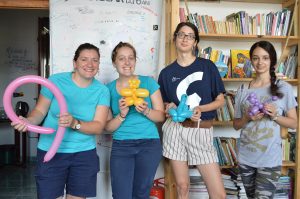
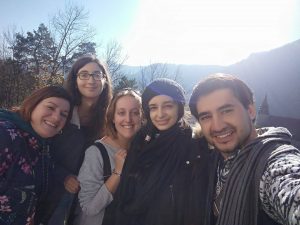
Acum vă voi spune mai multe despre super-mentorul meu! Numele ei este Elena, dar toți o strigă Tromppy (motivul va rămâne secret 😉 )
Îmi amintesc cu exactitate prima noastră întâlnire. Am sosit pe 10 aprilie în România și în ziua următoare am întâlnit-o în Brașov. Ziua a fost una obositoare din mai multe motive, dar a fost începutul unei aventuri frumoase pentru mine. Împreună cu Sorin am plecat de la Curba de Cultură spre Brașov, un oraș frumos la două ore distanță de Izvoarele, trecând prin munți și peisaje superbe. Apoi am întâlnit-o pe Tromppy și după o îmbrățișare de bun venit, am mers să bem o cafea într-unul din barurile studențești din oraș. Și am vorbit, vorbit și vorbit din nou cu engleza mea săracă, căutându-mi constant cuvintele și propozițiile, pentru a ne cunoaște mai bine. Apoi, târziu ne-am întors și pe drum m-am străduit să nu adorm în cele două ore de drum cu mașina. Nu voi uita această a doua zi în România.
After this first meeting, we met one or two times per month, in the office or in Brașov. Each time, it was about new adventures, feelings, stories that we shared together, during one, two or three hours sometimes. Because, the mentoring isn’t only about myself, it’s a sharing about personal experiences together. And with Tromppy, we have to force ourselves to stop talking at some point, to let time for my housemates. Since June I’m not the only volunteer anymore!
We have a really good feeling, she is my guide and my personal support, and thanks to her I discovered some part of myself that I didn’t know before. But it’s not only a story of talking, it’s also a story of discoveries. We organised some meetings in Brașov to visit the town and the areas. We were fascinated by the beautiful view of the town and landscapes around, when we hiked mount ” Tampa”. And recently, we visited the center of Brasov, the “Black and White Towers”, from where we discovered another view. In general, when it’s possible, we enjoy to be outside, walking in the park of Schiulești, or somewhere else, our interest for the nature being common.
In brief, having a mentor like mine is A-MA-ZING! And I’m very glad that I met her during this volunteering, to talk, to laugh, to hug, to discover… Even though my lovely housemates Isabella, Alba, Gabriel and Roman, complain because of the time I spend with her for the mentoring. It does not matter, I enjoy each minute :)!
Dear volunteers, I hope you will meet a mentor who helps you to see further than you expect!
După această primă întâlnire, ne-am văzut o dată sau de două ori pe lună, la birou ori în Brașov. Fiecare dintre aceste întâlniri a fost despre noi aventuri, sentimente, povești pe care le-am împărtășit de-a lung a una, două sau chiar trei ore câteodată. Deoarece mentoratul nu este doar despre mine este și despre împărtășirea experiențelor personale. Iar cu Tromppy trebuie să ne forțăm să ne oprim la un moment dat, să lăsăm timp și pentru colegii mei. Începând din iunie nu mai sunt singurul voluntar!
Ne simțim bine împreună, este ghidul și suportul meu personal și mulțumită ei am descoperit o parte din mine pe care nu o știam înainte. Dar nu este doar o poveste despre vorbit ci și despre descoperiri. Unele dintre întâlniri le-am organizat în Brașov pentru a vizita orașul și zona. Am fost fascinați de aspectul orașului și de peisajul dimprejur câmd am urcat pe Tâmpa. Recent am vizitat centrul Brașovului, Turnul Alb și Turnul Negru de unde am descoperit o nouă perspectivă. În general, când e posibil ne bucurăm de timpul petrecut afară, ne plimbăm prin parcul din Schiulești sau altundeva, interesul nostru pentru natură fiind comun.
Pe scurt să am un mentor ca ea este UI-MI-TOR! Și sunt foarte fericită că am întâlnit-o în timpul acestui stagiu de voluntariat pentru că am cu cine vorbi, râde, îmbrățișa și descoperi… Chiar dacă colegii mei dragi Isabella, Alba, Gabriel și Roman se plâng că petrec prea mult timp în ședințele de mentorat. Nu are importanță, mă bucur de fiecare minut :)!
Dragi voluntari, sper că veți avea și voi un mentor care să vă ajute să vedeți mai departe decât vă așteptați!
Estelle este în România pentru o perioadă de nouă luni, din aprilie până în decembrie 2017, în cadrul proiectului EVS20: Let’s Move and Change [2016-3-FR02-KA105-012345] proiect co-finanțat de Uniunea Europeană prin Programul Erasmus+ și implementat în România de către Curba de Cultură.